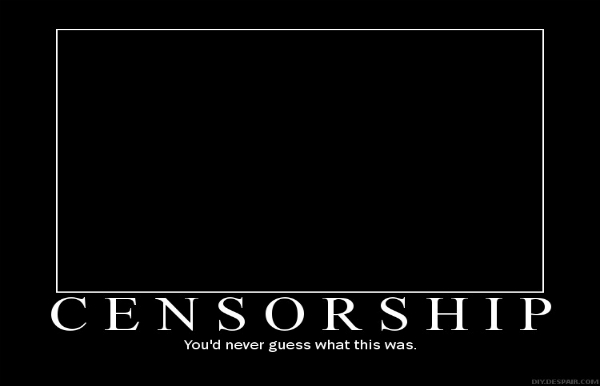
Aravot website editor Anna Israelyan’s article “The Internet is Not a Bathroom Wall Where You Can Write Anything and Everything” (in Armenian only) provided food for thought for this article, as well as attorney Artur Grigoryan’s lawsuit against local daily Hraparak in which the attorney is demanding no more and no less than 18 million drams (approx. $47,000 USD) for comments to the article “Are Citizens Victims of Dishonest Lawyers?”
Moderating Comments
It can be said that these two news outlets have opposite views on the matter of moderating comments. Whereas Aravot, from the start, stated its rules for leaving comments and placed certain limitations, Hraparak, on the other hand, at least until the aforementioned lawsuit, published comments which could’ve contained insult and libel aimed at not only the site but also individual authors and editors. That is, Hraparak spared nothing and published nearly all comments, except perhaps those that contained profanities of a sexual nature (I never came across any on the site).
The resolution to the Hraparak case might determine which way sites will go. But it won’t, of course, be the answer to all questions because the public’s distrustful attitude toward court rulings and imperfections in the law will continue to keep the issue open as to where necessary moderation ends and where restriction or censorship of free speech begins.
The acceptable version for me is the posting of all comments except for those containing vulgar profanities. But it’s understandable that there can be different approaches.
To demand from readers that in expressing an opinion about someone they must cite facts is absurd; at the same time, if there are facts in the comments, say, about a crime, then it’s understandable that for safety reasons, the reader might not want to make her name public. One can come across many uncredited news reports and articles, as well as several articles written by journalists under a pseudonym. Do such news agencies have a moral right to demand that people who leave comments must use their real names?
In this sense, Aravot favorably differs from the rest of the news outlets. The news agency has announced that “uncredited articles are not respected” — it’s hard to find an uncredited article or report on this site that bears the same name as the paper.
However, another discrepancy may arise in the case of Aravot. On the site, the news agency’s reporters have their own spaces — blogs where they record their thoughts, memories, approaches, ideas, but it doesn’t say what the procedure is for moderating comments to blog posts. Since in these spaces the authors have more freedom to present their views and personal opinions, it’s assumed that more freedom must be given for comments as well.
A significant portion of comments on news sites are evaluative in nature. And besides, those “assessments” might relate to the author just as much as to the article. I think that in moderating, news outlets have to clearly define whether such comments are permissible and if so, they should display a balanced approach in permitting them. Say, if comments such as “it’s an honest, unbiased article” and “you’re an honest journalist” can be posted then so too must comments such as “a pointless article written on commission” and “you’re a journalist who’s been sold.”
Censorship and Moderation
In a classical sense, censorship is the full or partial control and intervention by the state or authorities in the dissemination of information and ideas. As you know, censorship is specific to totalitarian and authoritarian systems, but not only. We can cite several vivid examples from our not-too-distant Soviet past. But such perhaps less vivid examples can be found more or less in democratic countries. You can come across incidents of censorship, for example, in Europe applied toward right-wing extremists and in the US, toward the far left.
Though the Internet is the freest and most open space, but it too is regularly subject to censorship in this or that country. The most vivid example is probably Google leaving China. Under conditions of economic liberalization and democratic processes it’s hard for any state or government to impose complete censorship on means disseminating information and ideas, more so on the Internet. In this case, to exert control over this space, no country’s authorities or state can resort to intimidation and threats or bribes and placation, as well as create their own news agencies directly or through intermediaries and flood the online space. In Armenia, you can find numerous examples when state officials have established press clubs, TV companies or online news sites where, naturally, subject to censorship are “inexpedient” information and ideas.
Can moderation of comments in some cases perhaps be considered censorship? I think, yes.
Censorship is a political concept, and in dealing with censorship we are necessarily dealing with politics, though at first glance it might have no connection to politics. In the Soviet Union, speaking about sexual freedom was prohibited, but not because people weren’t having sex or because it wasn’t interesting.
Censorship is not simply the prohibiting, editing or “correcting” of a piece, but the “correcting,” editing and prohibiting from the viewpoint of political (ideological) inexpediency. Consequently, the moderator prohibiting comments is censorship if it was done because of the comment’s political inexpediency.
Hambardzum Hambardzumyan
The views expressed in the column are those of the author's and do not necessarily reflect the views of Media.am.

Add new comment
Comments by Media.am readers become public after moderation. We urge our readers not to leave anonymous comments. It’s always nice to know with whom one is speaking.
We do not publish comments that contain profanities, non-normative lexicon, personal attacks or threats. We do not publish comments that spread hate.